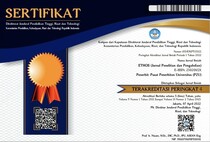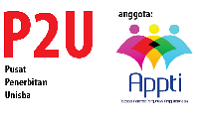Kebutuhan Kegiatan Webinar tentang Disposisi Berpikir
Abstract
Abstract. This thinking disposition is important for a teacher and prospective teacher. However, there a prospective teacher who understands the thinking disposition. Therefore, it is important to conduct a webinar to equip prospective teachers about thinking dispositions. Before the webinar activity is carried out, it is necessary to analyze the needs for the implementation of the webinar on thinking disposition. Therefore, the purpose of this study is needed analyze implementing a webinar activity on thinking dispositions. This research method is quantitative research with a survey approach. This survey was conducted on 84 respondents consisting of 69 undergraduate students, 1 doctoral student, 10 teachers, and 4 lecturers. The survey data collected in this study consisted of questionnaire data about respondents' knowledge of thinking dispositions and their opinions in participating in webinar activities of thinking dispositions. The data of questionnaire results show that the knowledge of respondents about the thinking disposition is 38.45% which is in the very low category. Data of respondents' opinions show that 50% of respondents do not know about thinking dispositions and 42% of respondents know little about thinking dispositions. Thus the results of the questionnaire and respondents' opinions indicate that a webinar activity of thinking dispositions is needed which aims to increase students' knowledge of thinking dispositions.
Keywords: needs analysis, webinar, thinking disposition.
Abstrak. Disposisi berpikir ini penting untuk dimiliki oleh seorang guru dan mahasiswa calon guru. Akan tetapi, masih sedikit mahasiswa calon guru yang memahami tentang disposisi berpikir. Oleh karena itu, penting untuk dilaksanakan webinar dalam rangka membekali mahasiswa calon guru tentang disposisi berpikir. Sebelum kegiatan webinar dilakukan, terlebih dahulu dilakukan analisis kebutuhan pelaksanaan webinar tentang disposisi berpikir. Oleh karena itu, tujuan penelitian ini adalah melakukan analisis kebutuhan pelaksanaan kegiatan webinar tentang disposisi berpikir. Metode penelitian ini adalah penelitian kuantitatif dengan pendekatan survei. Survei ini dilakukan terhadap 84 responden yang terdiri dari 69 mahasiswa S1, 1 mahasiswa S3, 10 Guru, dan 6 Dosen. Data hasil survei yang dikumpulkan dalam penelitian ini terdiri dari data angket tentang pengetahuan responden terhadap disposisi berpikir dan pendapatnya dalam mengikuti kegiatan webinar tentang disposisi berpikir. Data yang berupa hasil angket menunjukkan bahwa pengetahuan responden tentang disposisi berpikir sebesar 38,45% yang berada pada kategori sangat rendah. Data yang berupa pendapat responden menunjukkan bahwa 50% responden belum mengetahui tentang disposisi berpikir dan 42% responden hanya mengetahui sedikit tentang disposisi berpikir. Dengan demikian, hasil pengisian angket dan pendapat responden menunjukkan bahwa dibutuhkan adanya kegiatan webinar tentang disposisi berpikir yang bertujuan untuk meningkatkan pengetahuan mahasiswa tentang disposisi berpikir.
Kata Kunci: analisis kebutuhan, webinar, disposisi berpikir.
Keywords
Full Text:
PDFReferences
Almerino, P. M., Etcuban, J. O., Jose, C. G. De, & Almerino, J. G. F. (2019). Students’ Affective Belief as the Component in Mathematical Disposition. International Electronic Journal of Mathematics Education, 14(3), 475–487. https://doi.org/https://doi.org/10.29333/iejme/5750
Clark, L. M., Depiper, J. N., Frank, T. J., Nishio, M., Campbell, P. F., Smith, T. M., … Choi, Y. (2014). Teacher Characteristics Associated With Mathematics Teachers’ Beliefs and Awareness of Their Students’ Mathematical Dispositions. Journal for Research in Mathematics Education, 45(2), 246–284.
Creswell, J. W. (2012). Educational Research Planning, Conducting and Evaluating Quantitative and Qualitative Research (Fourth). Boston: Pearson Education, Inc.
Hästö, P., Palkki, R., Tuomela, D., & Star, J. R. (2019). Relati ionship between b mathem matical fle exibility and suc ccess in nation nal exam minations s. European Journal of Science and Mathematics Education, 7(1), 1–13.
Karademir, C. A. (2019). Pre-Service Teachers’ Problem Solving Skills and Curiosity Levels. International Journal of Educational Methodology, 5(1), 151–164. https://doi.org/10.12973/ijem.5.1.163
Kele, A., & Sharma, S. (2014). Students’ Beliefs About Learning Mathematics: Some Findings From the Solomon Islands. Teachers and Curriculum, 14(1), 33–44. https://doi.org/10.15663/tandc.v14i1.92
Perkins, D. N., Jay, E., & Tishman, S. (1993). Beyond Abilities : A Dispositional Theory of Thinking. Merril-Palmer Quarterly, 39(1), 1–21.
Rittle-Johnson, B., & Star, J. R. (2007). Does Comparing Solution Methods Facilitate Conceptual and Procedural Knowledge? An Experimental Study on Learning to Solve Equations. Journal of Educational Psychology, 99(3), 561–574. https://doi.org/10.1037/0022-0663.99.3.561
Ron, S. (2001). From IQ to IC: A Dispositional View of Intelligence. Roeper Riview, 23(3), 1–23.
Setiawan, Y. E. (2020a). Analisis Kemampuan Siswa dalam Pembuktian Kesebangunan Dua Segitiga. Al-Khwarizmi: Jurnal Pendidikan Matematika Dan Ilmu Pengetahuan Alam, 8(1), 23–38. https://doi.org/http://dx.doi.org/10.24256/jpmipa.v8i1.80
Setiawan, Y. E. (2020b). Analisis Kesalahan Siswa dalam Menggeneralisasi Pola Linier. Jurnal Nasional Pendidikan Matematika, 4(2), 180–194. https://doi.org/http://dx.doi.org/10.33603/jnpm.v4i2.3386
Setiawan, Y. E. (2020c). Analisis Kesalahan Siswa dalam Menilai Kebenaran Suatu Pernyataan. Jurnal Didaktik Matematika, 7(1), 13–31. https://doi.org/10.24815/jdm.v7i1.14495
Setiawan, Y. E. (2020d). Disposisi Berpikir. Lumajang: CV. Al-Mukmin Yes.
Setiawan, Y. E. (2020e). Sistem Pendukung Pengambilan Keputusan Rekrutmen Guru Menggunakan Logika Fuzzy Tahani. Barekeng: Jurnal Ilmu Matematika Dan Terapan, 14(2), 259–272. https://doi.org/https://doi.org/10.30598/barekengvol14iss2pp259-272
Setiawan, Y. E., & Mustangin. (2020a). Kepraktisan Model Pembelajaran IDEA (Issue, Discussion, Establish, and Apply) dalam Pembelajaran Matematika. Aksioma: Jurnal Program Studi Pendidikan Matematika, 9(3), 776–788. https://doi.org/https://doi.org/10.24127/ajpm.v9i3.2917
Setiawan, Y. E., & Mustangin. (2020b). Validitas Model Pembelajaran IDEA ( Issue, Discussion, Establish, and Apply) untuk Meningkatkan Pemahaman Konsep. Jurnal Penelitian Pendidikan Dan Pengajaran Matematika, 6(1), 53–60. https://doi.org/https://doi.org/10.37058/jp3m.v6i1.1432
Setiawan, Y. E., Purwanto, Parta, I. N., & Sisworo. (2020). Generalization Strategy of Linear Patterns From Field-Dependent Cognitive Style. Journal on Mathematics Education, 11(1), 77–94. https://doi.org/http://doi.org/10.22342/jme.11.1.9134.77-94
Star, J. R., & Rittle-Johnson, B. (2008). Flexibility in Problem Solving: The Case of Equation Solving. Learning and Instruction, 18(2008), 565–579. https://doi.org/10.1016/j.learninstruc.2007.09.018
Tishman, S., & Andrade, A. (1995). Thinking Dispositions : A review of Current Theories, Practices, and Issues. Cambridge, MA: Harvard University Graduate School of Education.
Tishman, S., Jay, E., & Perkins, D. N. (1993). Teaching Thinking Dispositions : From Transmission to Enculturation. Theory Into Practice, 32(3), 147–153.
DOI: https://doi.org/10.29313/ethos.v9i2.7651
Refbacks
- There are currently no refbacks.
Alamat Redaksi:
LPPM Unisba, Lantai 2, Jl. Purnawarman 63, Bandung 40116, Jawa Barat, (022) 4203368 , (022) 4264064. ethos.unisba@gmail.com / ethos@unisba.ac.id

This work is licensed under a Creative Commons Attribution-NonCommercial-ShareAlike 4.0 International License.














